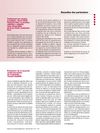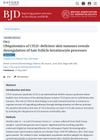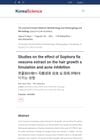 75 citations,
May 1986 in “Clinics in endocrinology and metabolism”
75 citations,
May 1986 in “Clinics in endocrinology and metabolism” Male hormones are important for hair and oil gland development and can cause conditions like excessive hair growth and acne.
 11 citations,
November 2017 in “Hong Kong Medical Journal”
11 citations,
November 2017 in “Hong Kong Medical Journal” Polycystic ovary syndrome increases the risk of diabetes, heart disease, and endometrial cancer, and requires early treatment to manage these risks.
 December 2010 in “Médecine des Maladies Métaboliques”
December 2010 in “Médecine des Maladies Métaboliques” The Accu-Chek FlexLink Plus and Accu-Chek LinkAssist Plus make insulin pump use safer, simpler, and more comfortable.
 July 2021 in “Advances in laboratory medicine”
July 2021 in “Advances in laboratory medicine” Diagnosing sex development disorders requires combining medical history, physical exams, imaging, lab tests, and genetic data.
 April 2018 in “The journal of investigative dermatology/Journal of investigative dermatology”
April 2018 in “The journal of investigative dermatology/Journal of investigative dermatology” Androgens increase growth factors in skin cells, which may lead to acne.
 49 citations,
August 2003 in “Journal of The American Academy of Dermatology”
49 citations,
August 2003 in “Journal of The American Academy of Dermatology” Higher IGF-1 levels in hair follicles link to better finasteride results for hair loss.
 192 citations,
September 2003 in “The Journal of clinical endocrinology and metabolism/Journal of clinical endocrinology & metabolism”
192 citations,
September 2003 in “The Journal of clinical endocrinology and metabolism/Journal of clinical endocrinology & metabolism” Metformin is effective for treating excessive hair growth in women with PCOS and may work better than the standard treatment in some ways.
 20 citations,
March 2017 in “Reproductive Biology and Endocrinology”
20 citations,
March 2017 in “Reproductive Biology and Endocrinology” Women with PCOS have higher 5α-reductase activity, which may be linked to insulin resistance.
 28 citations,
July 2017 in “Journal of Endocrinological Investigation”
28 citations,
July 2017 in “Journal of Endocrinological Investigation” Early onset baldness in men may indicate a condition similar to PCOS, linked to heart disease, diabetes, and prostate issues.
 4 citations,
August 2021 in “Clinical and Experimental Reproductive Medicine”
4 citations,
August 2021 in “Clinical and Experimental Reproductive Medicine” The 2018 guideline for PCOS suggests new diagnostic criteria and treatments, but recognizes the need for more research.
26 citations,
January 2016 in “Indian journal of endocrinology and metabolism” Both metformin and pioglitazone improve PCOS symptoms, but pioglitazone is a good alternative for those who can't take metformin.
 35 citations,
January 2011 in “Clinical Endocrinology”
35 citations,
January 2011 in “Clinical Endocrinology” Metformin should be used for PCOS mainly in those with glucose intolerance, and has limited benefits for infertility or hirsutism.
 14 citations,
October 2020 in “Journal of ethnopharmacology”
14 citations,
October 2020 in “Journal of ethnopharmacology” Lepidium sativum seed extracts helped reduce inflammation and improve insulin response in obese rats on a high-fat diet.
 7 citations,
March 2018 in “Asian-Australasian journal of animal sciences”
7 citations,
March 2018 in “Asian-Australasian journal of animal sciences” OCIAD2 and DCN genes affect hair growth in goats by having opposite effects on a growth signaling pathway and inhibiting each other.
Oregano extract can promote hair growth and has antioxidant benefits without being toxic.
 50 citations,
January 2013 in “Indian Journal of Dermatology”
50 citations,
January 2013 in “Indian Journal of Dermatology” Some skin conditions, like psoriasis and early-onset baldness, may indicate metabolic syndrome, and others are linked to diabetes risk and cardiovascular issues.
 7 citations,
January 2013 in “BioMed research international”
7 citations,
January 2013 in “BioMed research international” Hair follicles and deer antlers regenerate similarly through stem cells and are influenced by hormones and growth factors.
 May 2024 in “British journal of dermatology/British journal of dermatology, Supplement”
May 2024 in “British journal of dermatology/British journal of dermatology, Supplement” CYLD deficiency in skin tumors disrupts hair follicle cell processes and protein secretion.
 19 citations,
January 2013 in “Pediatrics in review”
19 citations,
January 2013 in “Pediatrics in review” The document says menstruation is important for women's health, discusses menstrual disorders, and suggests personalized treatment options.
January 2024 in “Medicina” Statins may help treat PCOS by lowering androgen levels and improving cholesterol.
26 citations,
June 2003 in “Obstetrics and gynecology clinics of North America” More research is needed to understand the long-term benefits of insulin-sensitizing drugs for treating adolescents with PCOS.
 April 2024 in “Canadian Women s Health Today”
April 2024 in “Canadian Women s Health Today” PCOS treatment focuses on lifestyle changes and specific medications to manage symptoms and complications.
 2 citations,
January 2002 in “The Journal of Korean Medicine Ophthalmology and Otolaryngology and Dermatology”
2 citations,
January 2002 in “The Journal of Korean Medicine Ophthalmology and Otolaryngology and Dermatology” Sophora flavescens extract helps hair grow and prevents acne.
11 citations,
July 2019 in “International journal of women’s dermatology” Certain skin conditions in women are linked to higher risks of metabolic syndrome and type 2 diabetes due to hormone imbalances.
 1 citations,
January 2023 in “Deleted Journal”
1 citations,
January 2023 in “Deleted Journal” PCOS negatively affects women's quality of life, especially if not detected early.
 4 citations,
November 2016 in “Archives of Endocrinology and Metabolism”
4 citations,
November 2016 in “Archives of Endocrinology and Metabolism” Insulin resistance is linked to larger thyroid volume in patients with polycystic ovary syndrome.
 60 citations,
September 2001 in “Journal of the American Academy of Dermatology”
60 citations,
September 2001 in “Journal of the American Academy of Dermatology” Insulin resistance contributes to hormone imbalances in many women with polycystic ovary syndrome.
 June 2024 in “Research Square (Research Square)”
June 2024 in “Research Square (Research Square)” Young women in West Bengal, India, with PCOS often have estrogen resistance, leptin receptor issues, folate deficiency, T2DM, and acanthosis, commonly linked to obesity.
 1 citations,
November 2015 in “European medical journal”
1 citations,
November 2015 in “European medical journal” Acne is common and can be linked to various systemic health conditions and syndromes.
 105 citations,
February 2011 in “The Journal of Clinical Endocrinology & Metabolism”
105 citations,
February 2011 in “The Journal of Clinical Endocrinology & Metabolism” Treating sleep apnea in young obese women with PCOS can improve heart health and insulin sensitivity.

























